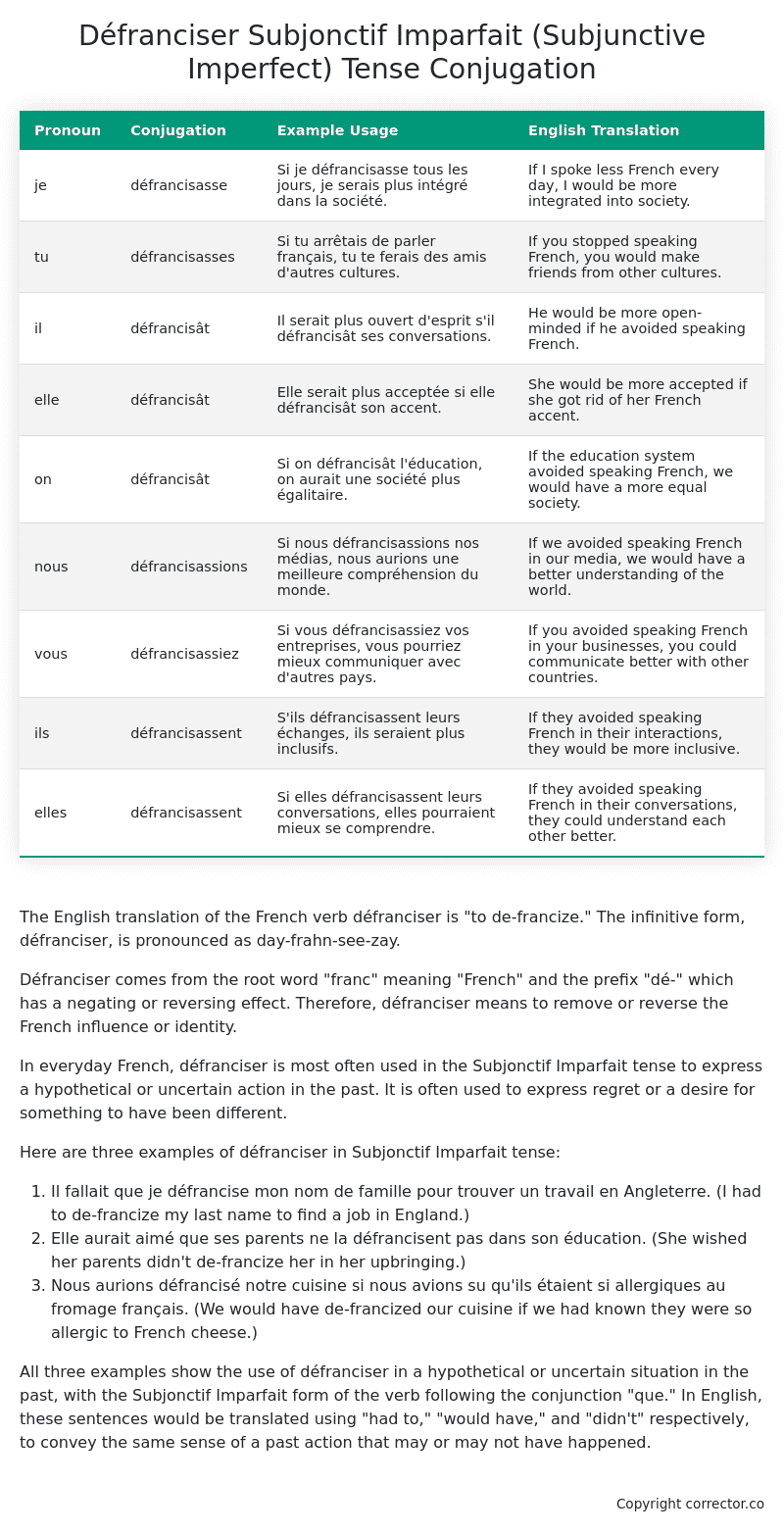Subjonctif Imparfait (Subjunctive Imperfect) Tense Conjugation of the French Verb défranciser
Introduction to the verb défranciser
The English translation of the French verb défranciser is “to de-francize.” The infinitive form, défranciser, is pronounced as day-frahn-see-zay.
Défranciser comes from the root word “franc” meaning “French” and the prefix “dé-” which has a negating or reversing effect. Therefore, défranciser means to remove or reverse the French influence or identity.
In everyday French, défranciser is most often used in the Subjonctif Imparfait tense to express a hypothetical or uncertain action in the past. It is often used to express regret or a desire for something to have been different.
Here are three examples of défranciser in Subjonctif Imparfait tense:
- Il fallait que je défrancise mon nom de famille pour trouver un travail en Angleterre. (I had to de-francize my last name to find a job in England.)
- Elle aurait aimé que ses parents ne la défrancisent pas dans son éducation. (She wished her parents didn’t de-francize her in her upbringing.)
- Nous aurions défrancisé notre cuisine si nous avions su qu’ils étaient si allergiques au fromage français. (We would have de-francized our cuisine if we had known they were so allergic to French cheese.)
All three examples show the use of défranciser in a hypothetical or uncertain situation in the past, with the Subjonctif Imparfait form of the verb following the conjunction “que.” In English, these sentences would be translated using “had to,” “would have,” and “didn’t” respectively, to convey the same sense of a past action that may or may not have happened.
Table of the Subjonctif Imparfait (Subjunctive Imperfect) Tense Conjugation of défranciser
| Pronoun | Conjugation | Example Usage | English Translation |
|---|---|---|---|
| je | défrancisasse | Si je défrancisasse tous les jours, je serais plus intégré dans la société. | If I spoke less French every day, I would be more integrated into society. |
| tu | défrancisasses | Si tu arrêtais de parler français, tu te ferais des amis d’autres cultures. | If you stopped speaking French, you would make friends from other cultures. |
| il | défrancisât | Il serait plus ouvert d’esprit s’il défrancisât ses conversations. | He would be more open-minded if he avoided speaking French. |
| elle | défrancisât | Elle serait plus acceptée si elle défrancisât son accent. | She would be more accepted if she got rid of her French accent. |
| on | défrancisât | Si on défrancisât l’éducation, on aurait une société plus égalitaire. | If the education system avoided speaking French, we would have a more equal society. |
| nous | défrancisassions | Si nous défrancisassions nos médias, nous aurions une meilleure compréhension du monde. | If we avoided speaking French in our media, we would have a better understanding of the world. |
| vous | défrancisassiez | Si vous défrancisassiez vos entreprises, vous pourriez mieux communiquer avec d’autres pays. | If you avoided speaking French in your businesses, you could communicate better with other countries. |
| ils | défrancisassent | S’ils défrancisassent leurs échanges, ils seraient plus inclusifs. | If they avoided speaking French in their interactions, they would be more inclusive. |
| elles | défrancisassent | Si elles défrancisassent leurs conversations, elles pourraient mieux se comprendre. | If they avoided speaking French in their conversations, they could understand each other better. |
Other Conjugations for Défranciser.
Le Present (Present Tense) Conjugation of the French Verb défranciser
Imparfait (Imperfect) Tense Conjugation of the French Verb défranciser
Passé Simple (Simple Past) Tense Conjugation of the French Verb défranciser
Passé Composé (Present Perfect) Tense Conjugation of the French Verb défranciser
Futur Simple (Simple Future) Tense Conjugation of the French Verb défranciser
Futur Proche (Near Future) Tense Conjugation of the French Verb défranciser
Plus-que-parfait (Pluperfect) Tense Conjugation of the French Verb défranciser
Passé Antérieur (Past Anterior) Tense Conjugation of the French Verb défranciser
Futur Antérieur (Future Anterior) Tense Conjugation of the French Verb défranciser
Subjonctif Présent (Subjunctive Present) Tense Conjugation of the French Verb défranciser
Subjonctif Passé (Subjunctive Past) Tense Conjugation of the French Verb défranciser
Subjonctif Imparfait (Subjunctive Imperfect) Tense Conjugation of the French Verb défranciser (this article)
Conditionnel Présent (Conditional Present) Tense Conjugation of the French Verb défranciser
Conditionnel Passé (Conditional Past) Tense Conjugation of the French Verb défranciser
L’impératif Présent (Imperative Present) Tense Conjugation of the French Verb défranciser
L’infinitif Présent (Infinitive Present) Tense Conjugation of the French Verb défranciser
Struggling with French verbs or the language in general? Why not use our free French Grammar Checker – no registration required!
Get a FREE Download Study Sheet of this Conjugation 🔥
Simply right click the image below, click “save image” and get your free reference for the défranciser Subjonctif Imparfait tense conjugation!

Défranciser – About the French Subjonctif Imparfait (Subjunctive Imperfect) Tense
Formation
Common Everyday Usage Patterns
Interactions with Other Tenses
Subjonctif Présent
Indicatif Passé Composé
Conditional
Conditional Perfect
Summary
I hope you enjoyed this article on the verb défranciser. Still in a learning mood? Check out another TOTALLY random French verb conjugation!


